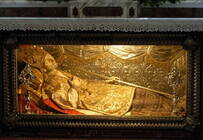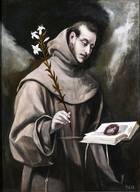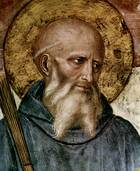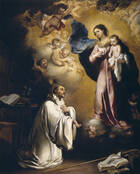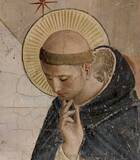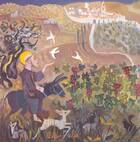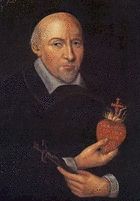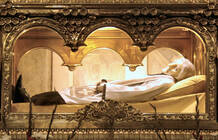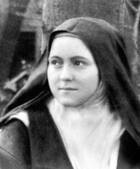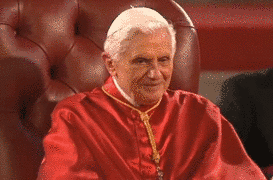
Papa Benedict XVI's Catecheses on the Saints
given at his Wednesday Audiences
Saint Alphonsus Mary Liguori 
BXVI: "St Alphonsus, above all in his main work entitled Moral Theology, proposes a balanced and convincing synthesis between the demands of God’s law, engraved on our hearts, fully revealed by Christ and authoritatively interpreted by the Church, and the dynamics of man's conscience and freedom, which precisely in adherence to truth and goodness allow the maturation and realization of the person. Alphonsus recommended to pastors of souls and to confessors that they be faithful to Catholic moral doctrine, while at the same time assuming a charitable, understanding, sweet attitude so that penitents could feel accompanied, supported, encouraged on their pathway of faith and Christian life. St Alphonsus never tired of repeating that priests are a visible sign of the infinite mercy of God, who forgives and illuminates the mind and heart of the sinner so that he may be converted and change his life. In our epoch, in which there are clear signs of the loss of moral conscience and — it must be recognized — of a certain lack of esteem for the Sacrament of Confession, St Alphonsus’ teaching is still of great actuality.
.. Among the forms of prayer fervently recommended by St Alphonsus stands out the visit to the Most Holy Sacrament or, as we would say today, adoration, brief or prolonged, personal or as a community, before the Eucharist. “Certainly” - writes Alphonsus - “amongst all devotions that of adoring Jesus in the Blessed Sacrament is the first after the sacraments, the dearest to God and the most useful to us… Oh, what beautiful delight to stay before an altar with faith… and to present ones needs to him, as a friend does to another friend in whom one has full confidence!” (Visits to the Blessed Sacrament and to the Blessed Virgin Mary for each day of the month. Introduction). Alphonsian spirituality is in fact eminently Christological, centred on Christ and His Gospel. Meditation on the mystery of the Incarnation and the Passion of the Lord are frequently the subject of his preaching. In these events, in fact, the Redemption is offered “copiously” to all men and women. And precisely because it is Christological, Alphonsian piety is also exquisitely Marian. Deeply devoted to Mary, he illustrates her role in the history of salvation: associate in the Redemption and Mediatrix of grace, Mother, Advocate and Queen. Furthermore, St Alphonsus affirms that devotion to Mary will be of great comfort to us at the moment of our death. He was convinced that meditation on our eternal destiny, on our call to participate for ever in the beatitude of God, as well as on the tragic possibility of damnation, contributes to living with serenity and commitment, and to facing the reality of death, always retaining all trust in the goodness of God."
Saint Anthony of Padua (& Lisbon) 
BXVI: "On the one hand the Nativity, a central point of Christ's love for humanity, but equally the vision of the Crucified One inspires in Anthony thoughts of gratitude to God and of esteem for the dignity of the human person, thus that everyone, believers and non-believers, can find in the Crucified One and in his image a meaning that enriches life. St Anthony writes: "Christ, who is your life, is hanging before you, so that you may look in the cross as in a mirror. There you will be able to know how mortal were your wounds, that no medicine could heal except that of the blood of the Son of God. If you look closely, you will be able to realize how great are your human dignity and your worth .... In no other place can man better realise how much he is worth than by looking at himself in the mirror of the cross" (Sermones Dominicales et Festivi III, p 213-214).
In meditating upon these words we can better understand the importance of the image of the Crucified One for our culture, for our humanism born of Christian faith. Precisely by looking at the Crucified One we see, as St Anthony says, how great is human dignity and man's worth. At no other point can we understand how much man is worth, precisely because God renders us thus important, sees us thus important, as to be, for Him, worthy of his suffering; thus all human dignity appears in the mirror of the Crucified One and the gaze upon Him is always the source of the recognition of human dignity."
Saint Benedict of Norcia 
BXVI: "Benedict describes the Rule as "minimal, tracing only an initial outline" (73, 8); in reality, however, it offers useful directions not only to monks, but also to all those who seek guidance on their pathway to God. For its measure, humanity and sober discernment between the essential and the secondary in spiritual life, it has been able to maintain its illuminating force all the way up to the present time. Paul VI, by proclaiming St Benedict Patron of Europe on 24 October 1964, intended to recognize the marvellous work accomplished by the Saint through his Rule for the formation of European civilization and culture. Today Europe - having just exited a century deeply wounded by two World Wars and then the collapse of the great ideologies that were revealed as tragic utopias - is in search of its own identity. In order to create new and lasting unity, political, economic and juridical instruments are certainly important, but an ethical and spiritual renewal must also be awakened which draws upon the Christian roots of the Continent, otherwise Europe cannot be rebuilt. Without this vital sap, man remains exposed to the danger of succumbing to the age-old temptation of wanting to redeem himself by himself - a utopia which, in different ways, in 20th century Europe has caused, as Pope John Paul II pointed out, "a regression without precedent in the tormented history of humanity". In seeking true progress, let us too listen today to the Rule of St Benedict as a light on our pathway. The great monk remains a true master at whose school we can learn the art of living true humanism."
St Bernard of Clairvaux 
San Bernardo di Chiaravalle 
BXVI: "These reflections, characteristic of a lover of Jesus and Mary like St Bernard, in a salutary way provoke still today not only theologians, but all believers. Sometimes one pretends to have resolved the fundamental questions about God, about man and about the world with the sole forces of reason. Instead St Bernard, solidly founded on the Bible and the Fathers of the Church, reminds us that without a profound faith in God, nourished by prayer and contemplation, by an intimate relationship with the Lord, our reflections on the divine mysteries risk becoming a vain intellectual exercise, and lose their credibility. Theology refers to the "science of the saints", to their intuition of the mysteries of the living God, to their wisdom, gift of the Holy Spirit, which become a point of reference for theological thought. Together with Bernard of Clairvaux, we too must recognize that man better seeks and more easily finds God "with prayer than with discussion". In the end, the truest figure of a theologian and of every evangelizer remains that of the apostle John, who laid his head on the heart of the Master.
I would like to conclude these reflections on St Bernard with the invocations to Mary, which we read in one of his beautiful homilies: "In dangers, in distress, in uncertainties," - he says - " think of Mary, invoke Mary. Let her never be detached from your lips, let her never be detached from your heart; and that you may obtain the help of her prayer, never forget the example of her life. If you follow her, you will not go astray; if you pray to her, you will not despair; if you think of her, you cannot be deceived. If she sustains you, you do not fall; if she protects you, you have nothing to fear; if she guides you, you do not grow tired; if she is favourable to you, you will reach the goal"."
Saint Dominic 
BXVI: "When Dominic died in 1221 in Bologna, the city that declared him its Patron, his work had already had great success. With the support of the Holy See, the Order of Preachers had spread to many countries in Europe for the benefit of the entire Church. Dominic was canonized in 1234 and it is he himself who, with his holiness, indicates to us two indispensable means for making apostolic action incisive. First of all, Marian devotion, which he cultivated with tenderness and left as a precious legacy to his spiritual children, who in the history of the Church have had the great merit of spreading the prayer of the Holy Rosary, so dear to the Christian people and so rich in Gospel values, a true school of faith and piety. In the second place, Dominic, who took care of several women's convents in France and in Rome, believed through and through in the value of intercessory prayer for the success of apostolic work. Only in Heaven will we understand how much the prayers of cloistered religious efficaciously accompanies apostolic action! To each of them I direct my grateful and affectionate thoughts.
Dear brothers and sisters, may the life of Dominic de Guzmán spur us all to be fervent in prayer, courageous in living the faith and deeply in love with Jesus Christ. Through his intercession, let us ask God to enrich the Church always with authentic preachers of the Gospel."
Saint Francis of Assisi 
San Francesco d'Assisi 
BXVI: "In Francis love for Christ expressed itself in a special way in adoration of the Most Holy Sacrament of the Eucharist. Moving expressions can be read in the Franciscan Sources, such as: "Let all of humanity fear, the entire universe tremble and the heavens exult, when on the altar, in the hands of the priest, there is Christ, the Son of the living God. Oh stupendous favour! O humble sublimity, that the Lord of the universe, God and Son of God, so humbles himself as to hide himself for our salvation, under the modest form of bread" ...
From the love for Christ is born love towards persons and also towards all God's creatures. Here is another characteristic trait of Francis' spirituality: the sense of universal brotherhood and love for created matter, which inspired his famous Canticle of creatures. It is a very timely message. As I recalled in my recent encyclical Caritas in Veritate, only a development that respects creation and does not damage the environment is sustainable (cf n 48-52) and in the Message for the World Day of Peace this year I underlined that the construction of a solid peace is also linked to respect for created matter. Francis reminds us that in creation is unfolded the wisdom and benevolence of the Creator. Nature is for him understood precisely as a language in which God speaks with us, in which reality becomes transparent and we can speak of God and with God.
Dear friends, Francis was a great saint and a joyful man. His simplicity, his humility, his faith, his love for Christ, his goodness towards every man and every woman made him happy in every situation. Indeed, there subsists an intimate and indissoluble relationship between holiness and joy. A French writer said that in the world there is only one sadness: that of not being saints, that is, of not being close to God. Looking at the witness of St Francis, we understand that this is the secret of true happiness: to become saints, close to God!"
Saint John Eudes 
"In the context of the Year for Priests, it is in my heart to pause to underline the apostolic zeal of St John Eudes, particularly directed to the formation of diocesan clergy. The saints are the true interpretation of Sacred Scripture. The saints have verified, in the experience of life, the truth of the Gospel; thus they introduce us into knowing and understanding the Gospel. The Council of Trent, in 1563, had issued norms for the erection of diocesan seminaries and for the formation of priests, as the Council was well aware that the whole crisis of the reform was also conditioned by an insufficient formation of priests, who were not prepared for the priesthood in a just way, intellectually and spiritually, in the heart and soul. This was in 1563; but since the application and realization of the norms were delayed both in Germany and in France, St John Eudes saw the consequences of this lack. Moved by a lucid awareness of the grave need for spiritual help, in which souls lay precisely because of the inadequacy of the majority of the clergy, the saint, who was a parish priest, established a Congregation dedicated in a specific way to the formation of priests. In the university town of Caen he founded his first seminary, an experience highly appreciated, which very soon extended to other dioceses. The pathway of holiness, which he traveled and proposed to his followers, had as its foundation a solid trust in the love that God has revealed to humanity in the priestly Heart of Christ and in the maternal Heart of Mary. In that time of cruelty, of loss of interiority, he turned to the heart with the line of the prophetic word (Is 46, 8): Redite, praevaricatores, ad cor - often commented on by St Augustine. He wanted to recall people, men and women and above all future priests to the heart, by showing the priestly Heart of Christ and the maternal Heart of Mary. Every priest must be witness and apostle of this love of the heart of Christ and of Mary."
St John Mary Vianney, Curé of Ars 
BXVI: "The pastoral methods of St John Mary Vianney may appear little suited to the social and cultural conditions of the present day. How in fact could a priest today imitate him, in a world that has changed so much? If it is true that times change and many charisms are typical of the person, hence inimitable, there is however a style of life and a basic yearning that we are all called to cultivate. At closer inspection, what made the Curé of Ars holy was his humble faithfulness to the mission to which God had called him; it was his constant abandonment, full of trust, into the hands of divine Providence. He succeeded in touching people's hearts not by strength of his own human gifts, nor by relying exclusively on an effort, however laudable, of his will; he conquered souls, even the most refractory ones, by communicating to them that which he lived intimately, namely, his friendship with Christ. He was "in love" with Christ, and the true secret of his pastoral success was the love that he nourished through the eucharistic Mystery, announced, celebrated and lived, which became love for Christ's flock, for Christians and for all people who were seeking God. His testimony reminds us, dear brothers and sisters, that for each baptized person, and even more for the priest, the Eucharist "is not simply an event with two protagonists, a dialogue between God and me. Eucharistic Communion tends to a total transformation of one's own life. With force it opens wide the entire I of man and creates a new we (Joseph Ratzinger).
Thus, far from reducing the figure of St John Mary Vianney to an example, albeit an admirable one, of 19th century devotional spirituality, it is necessary on the contrary to grasp the prophetic force that marked his very topical human and priestly personality. In post-revolutionary France, which was experiencing a sort of "dictatorship of rationalism" aimed at erasing the very presence of priests and of the Church in society, he lived first, in the years of his youth, a heroic secrecy, travelling kilometres at night so as to participate in Holy Mass. Then, as a priest, he distinguished himself through a singular and fruitful pastoral creativity, apt to show that the then prevaling rationalism was in reality far from satisfying the authentic needs of man and thus, definitively, was not livable.
Dear brothers and sisters, 150 years after the death of the holy Curé of Ars, the challenges of contemporary society are no less demanding, indeed they may have become more complex. If then there was the "dictatorship of rationalism", in the current epoch a sort of "dictatorship of relativism" is seen in many areas. Both appear inadequate responses to the just demand of man to use fully his own reason as a distinctive and constitutive element of his own identity. Rationalism was inadequate because it does not take into account human limitations and claims to elevate reason alone as measure of all things, transforming it into a goddess; contemporary relativism mortifies reason, because in fact it ends up affirming that the human being cannot know anything with certainty beyond the positive scientific field. Today however, as then, man "a beggar for meaning and fulfilment", goes in constant search of exhaustive answers to the fundamental questions that he never ceases to ask himself."
Saint Therese of Lisieux 
Santa Teresa di Lisieux 
BXVI: "Dear friends, we too, with St Therese of the Child Jesus, must be able to repeat to the Lord every day that we want to live of love for him and for others, to learn at the school of the saints to love in an authentic and total way. Therese is one of the Gospel's “little ones" who let themselves be led by God into the depths of his Mystery. A guide for everyone, above all for those who, in the People of God, carry out the ministry of theologians. With humility and charity, faith and hope, Therese entered continually into the heart of Sacred Scripture which contains the Mystery of Christ. And this reading of the Bible, nourished by the science of love, is not opposed to academic science. The science of the saints, in fact, of which she herself speaks in the last page of The Story of a Soul, is the highest science. “All the saints have understood and in a more particular way perhaps those who fill the universe with the radiance of evangelical doctrine. Was it not from prayer that the saints Paul, Augustine, John of the Cross, Thomas Aquinas, Francis, Dominic and so many other illustrious Friends of God have drawn this divine science that fascinates the greatest geniuses?” Inseparable from the Gospel, the Eucharist is for Therese the Sacrament of Divine Love that stoops to extremes so as to raise us to Him. In her last Letter, on a picture that showed the Child Jesus in the consecrated Host, the Saint wrote these simple words: “I cannot fear a God who, for me, made himself so little! […] I love Him! In fact, He is nothing but Love and Mercy!”
In the Gospel, Therese discovered above all the Mercy of Jesus, to the point of affirming: “To me He has given his infinite Mercy, through it I contemplate and adore his other divine perfections! (..) Thus all appear to me radiant with Love, Justice itself (even more perhaps than the rest) seems to me clothed with Love”. She also expresses herself thus in the last lines of The Story of a Soul: “As soon as I look at the Holy Gospel, at once I breathe the fragrances of the life of Jesus and I know which way to run .. It is not to the first place that I rush, but to the last …. Yes I feel, even if I had on my conscience all the sins that can be committed, I would go, with my heart broken with repentance, to throw myself into the arms of Jesus, because I know how much he loves the prodigal son who returns to Him" “Trust and Love” are thus the final point of the tale of her life, two words that like beacons illuminated her whole pathway of holiness, so as to be able to guide others on the same “little way of trust and love”, of spiritual childhood. Trust like that of a child who abandons himself into the hands of God, inseparable from the strong, radical commitment of true love, which is the total gift of oneself/self, for ever, as the Saint said contemplating Mary: “To love is to give all, and to give oneself” (Because I love you, O Mary, P 54/22). Thus Therese indicates to us all that Christian life consists in fully living the grace of Baptism in the total gift of oneself to the Love of the Father, so as to live like Christ, in the fire of the Holy Spirit, His same love for everyone else. Thank you."

